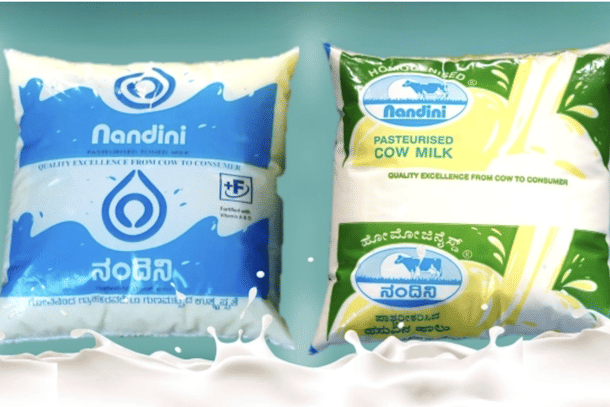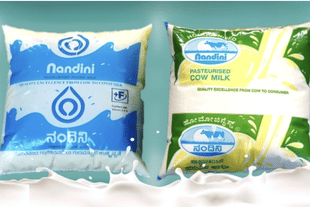Politics
Explained: Why Amul-Nandini Controversy Appears To Be More A Case Of An Issue Raked Up In Run Up To An Election
Swarajya Staff
Apr 10, 2023, 11:43 AM | Updated 11:43 AM IST
Save & read from anywhere!
Bookmark stories for easy access on any device or the Swarajya app.


Amul, a milk cooperative brand from Gujarat that is entering the Karnataka market, is at the centre of a political debate just before the State Assembly elections scheduled for next month.
The entry of Amul in Karnataka has been used by the opposition to claim that Amul, backed by the BJP, could endanger the Karnataka Milk Federation (KMF) brand "Nandini," which is closely tied to the identity of Kannadigas.
On 5 April, Gujarat Co-operative Milk Marketing Federation (GCMMF) announced that it would start selling Amul milk and curd in Bengaluru.
On Sunday (9 April), the Bruhat Bengaluru Hotel Association jumped into this and said it has urged hotels in the capital city Bengaluru to use the products of local brand Nandini.
Later in the day, Congress leader and former chief minister Siddaramaiah accused the Basavaraj Bommai-led government of destroying the "state's pride".
The state government immediately went into damage-control mode.
Minister for Cooperatives S T Somashekar dispelled rumors of a proposal to merge KMF and Amul and criticised the Congress and the Janata Dal (Secular) for turning Amul's entry into Karnataka "into a political issue ahead of elections."
Karnataka Chief Bommai also defended Amul’s entry into the state and downplayed any threat to Nandini.
"There is no need for anyone to get concerned about Amul brand. We will initiate steps to make brand Nandini more competitive. Nandini will become number one brand in the country," Bommai said to reporters.
Meanwhile, GCMMF Managing Director Jayen Mehta has said that the dairy cooperative will never "undermine or undercut any dairy cooperative anywhere in India".
Mehtra further added that Amul milk is being sold in northern Karnataka markets such Belgaum and Hubli-Dharwad since 2015.
He said that the Amul brand is now entering the Bengaluru city but added that it will be sold only through e-commerce and quick commerce platforms.
"There’s no question of competing with Nandini,” Mehta was quoted as saying by IE.
Will Amul's entry affect Nandini's market?
The controversy surrounding Amul's entry into Karnataka's milk market, highlighted during the state's Assembly elections, may be a political issue, but the fact remains that no dairy company, not even the prominent Amul, can challenge the established position of the Karnataka Cooperative Milk Producers' (KMF) Federation.
KMF's Nandini milk is the most affordable brand in India. In Bengaluru, a litre of the 3 per cent fat and 8.5 per cent SNF (solids non-fat) Nandini toned milk costs only Rs 39, while Amul's toned milk in Delhi is priced at Rs 54 per litre and Rs 52 per litre in Gujarat.
GCMMF is charging Rs 66 per litre for Amul's full-cream milk containing 6 per cent fat and 9 per cent SNF.
The full-cream milk from Nandini was previously sold at Rs 50 for a litre and Rs 24 for 500 ml until early March. KMF has since then indirectly increased its prices by charging the same amount for smaller packs of 900 ml and 450 ml respectively.
Despite smaller sizes, Nandini full-cream milk costs Rs 53-56 per litre, much lower than Amul's.
Nandini curd's maximum retail price is Rs 47 per kg, while Amul charges Rs 66-67 per kg for curd with a 450 gm pouch being sold for Rs 30.
According to an industry source quoted by IE, KMF's low prices make it almost unbeatable in Karnataka, creating a virtual monopoly for Nandini.
How does Nandini maintains such low prices?
Former Chief Minister B S Yediyurappa led BJP government initiated a scheme in September 2008, which offered a Rs 2 per litre incentive to farmers who supplied milk to district unions affiliated with KMF (Karnataka Milk Federation), above and beyond the procurement price.
Five years later, the Congress government, led by Siddaramaiah, doubled the incentive in May 2013 and further raised it to Rs 5 per litre in November 2016.
In November 2019, when Yediyurappa again came back as Chief Minister, the incentive was further increased to Rs 6 per litre.
The government's yearly incentive payment to milk producers in Karnataka is roughly Rs 1,200 crore.
The incentives provided by the government has greatly boosted the dairy industry in Karnataka.
Dairying in Karnataka has been greatly boosted by a huge stimulus provided by the procurement by the KMF unions.
The KMF has seen its milk procurement rates soar in recent years, from an average of 30.25 lakh kg per day (LKPD) in 2007-08 to 81.66 LKPD in 2021-22, with only GCMMF's 263.66 LKPD surpassing it.
The two cooperative together account for about 60 per cent of the procurement by all dairy cooperatives in India.
KMF has benefited from the price incentive as it allows them to charge consumers less, thereby making it difficult for competitors like Amul to challenge Nandini in Karnataka.





